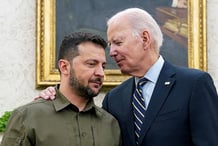
Despite its representation in the United Nations General Assembly (28 percent), Africa is unable to express any opinion on issues that concern it in the Security Council, as it is not a permanent member.
African leaders have long criticized the failure to grant permanent membership to the UN Security Council to any country from the 54-nation continent.
Senegalese President Macky Sall and South African President Cyril Ramaphosa raised the issue again in their press conference in the Senegalese capital, Dakar, which renewed the controversy and debate about the need to reform the United Nations.
Not only African countries, but also Asian and Latin American countries have expressed their desire to obtain permanent membership in the Security Council, but the five permanent members that have the right to “veto” the United States, China, Russia, France, and the United Kingdom do not look seriously at these demands.
In an interview seen by the editorial team of The Eastern Heral , African and Western experts spoke about their views and proposals on Africa’s demands for Security Council reform.
Africa is strengthening its influence
Nearly 70 percent of the Security Council’s decisions in recent years have been related to Africa, said Daniel Forte, a political analyst at the Brian Urquhart Center for Peace Operations.
Forte explained that African countries have identified two ways to confront this under-representation. The first is the continuous demands of African countries for reforms in the Security Council, and the demand to choose two African countries with veto rights and five non-permanent members that are changed every two years.
As for the other way, it is trying to enhance its influence through the group of three African countries representing “temporarily” the continent of Africa in the Security Council.
The three countries meet regularly in New York and Addis Ababa, make joint statements, and hold serious discussions and meetings on the subject.
Forte stressed that these two methods, on their own, cannot guarantee the implementation of structural reforms in the Security Council, or ensure the joint action of African countries in dealing with all issues, but they work to expand the sphere of influence of African countries as they move within the framework of common political interests.
Choosing new permanent members is not in the interest of the five permanent members
On the other hand, Dr. David Sylvan, a researcher in international relations at the Graduate Institute of Geneva, said that the matter is not limited to African countries only. Latin American countries and Asian countries, except for China and the Middle East countries as well, are not represented in the UN Security Council.
Sylvan added that despite numerous calls for an increase in the number of permanent members of the Security Council, no result has been reached so far, noting that one of the reasons for this is that the presence of new permanent members does not benefit the current five members who have veto power.
Silvan pointed out that African countries cannot face this under-representation as long as there are only five permanent members of the UN Security Council that have the right of veto.
He continued, “African countries have nothing to do about it. However, if new security organizations emerge anywhere in the world that also include African countries, a slight and indirect change may occur.”
African countries need peace and security programs
As for Ashraf Patel, a researcher at the Institute for Global Dialogue in South Africa, he said that the problem of the representation of African countries in the UN Security Council will not be solved or improved without taking medium-term steps.
And he added, “African countries need peace and security programs that focus on conflict resolution and economic and social development. Thus, their confidence will increase and they may be able, in the medium term, to obtain more seats in the Security Council.”
“There is a current need to strengthen regional institutions such as the Common Market for Eastern and Southern Africa (COMESA) and the Economic Community of West African States (ECOWAS), and to enhance capacities that enable peace in local crises,” he added.
Dr. Alexandra Novoselov of the International Peace Institute said that even if reforms are made to the UN Security Council, it is not yet known which African countries will become permanent members of the council.
Novoselov added that the authority for reform in the UN Security Council is not in the hands of Africa, but in the hands of the five permanent members and that China and the United States of America strongly oppose such demands.
“Even if the required reform is carried out, it is still unknown which African countries will get permanent membership. It is up to the African Union to make a choice,” she added.
She explained that African countries should focus more on the three temporary memberships granted to them in the council. And to focus on what it can achieve through these three countries.
Common Position
Mohamed Khaled Sayed, Deputy Speaker of the House of Representatives in the Republic of South Africa, said that African countries and leaders must work together against injustice and the lack of justice in the Security Council.
He stressed that African leaders such as those of South Africa, Senegal, and Ethiopia should adopt a common position not only in the political field but in the economic and security field as well.
Sayed expressed their desire to appoint representatives to the UN Security Council for the eastern, western, northern, and southern regions of Africa.
He pointed out that Turkish President Recep Tayyip Erdogan’s statement that “the world is greater than five” is valid and shows that the UN Security Council, with its current composition, lacks justice in representation.













